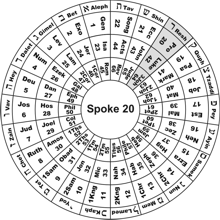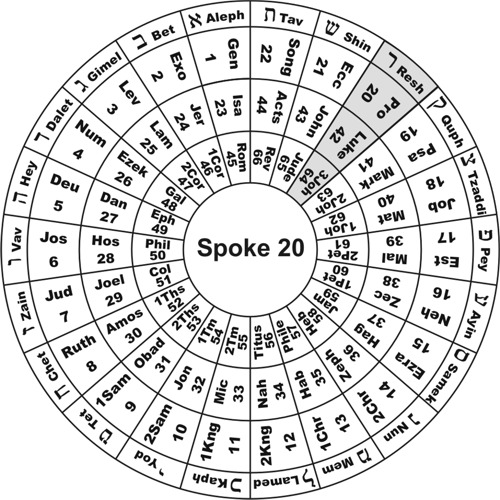Proverbs: Wisdom, Wealth, Poverty, and Health
The rich man's wealth is his strong city: the destruction
of the poor is their poverty (reysh).
Proverbs 10:15 (Spoke 20, Cycle 1)
The word translated as "poverty" in Proverbs 10:15 above is the Resh KeyWord reysh (poverty,
S# H7389). This word is identical to the Hebrew name of the
20th Letter ריש.
It appears exactly seven times in the Bible, with all occurrences being found only in the Book of Proverbs. Here
are the other six:
- Proverbs 6:11 So shall thy poverty (reysh) come as one that travelleth,
and thy want as an armed man.
- Proverbs 13:18 Poverty (reysh) and shame shall be to him that
refuseth instruction: but he that regardeth reproof shall be honoured.
- Proverbs 24:34 So shall thy poverty (reysh) come as one that travelleth;
and thy want as an armed man.
- Proverbs 28:19 He that tilleth his land shall have plenty of bread:
but he that followeth after vain persons shall have poverty (reysh) enough.
- Proverbs 30:8-9 Remove far from me vanity and lies:
give me neither poverty (reysh) nor riches; feed me with food convenient for me:
Lest I be full, and deny thee, and say, Who is the LORD? or lest I be poor, and steal,
and take the name of my God in vain.
- Proverbs 31:6-7 Give strong drink unto him that is ready to perish,
and wine unto those that be of heavy hearts. Let him drink, and forget his poverty (reysh),
and remember his misery no more.
The fact that the word reysh appears only in Proverbs - the first book on Spoke 20 - is one
of the most stunning demonstrations
of the supernatural design of the exact order and content of the Christian Canon on the pattern of
the Hebrew alphabet. But there is much more going on here. The
contrasting themes of ריש (reysh, poverty) versus
עשר (osher, wealth) are profoundly integrated
with the content of Proverbs, as we shall see below. Reysh and osher share the two consecutive letters
ר (Resh) and ש (Shin). They
differ only in that reysh contains a Yod and osher an Ayin, both of which are "vowel-like" consonants. The primary power
of these words is wrapped up in the letters Resh and Shin written in opposite directions in these two words.
Osher is a pun on the esser (ten, and also tenth or tithe) and so relates to
Yod (Hand) as the sign of personal possession and to the theme of the
Tenth Commandment, Covetousness. Each letter has meanings entwined with all the others, and these
meangings are combined and carried into the words they
form. This is the supernatural semantic algebra designed by God to communicate
His Divine Wisdom in the Holy Bible.
Healthy, Wealthy, and Wise
Riches and honour are with me; yea, durable riches and righteousness.
... I lead in the way of righteousness,
in the midst of the paths of judgment: That I may cause those that love me to
inherit substance; and I will fill their treasures.
Proverbs 8:18ff (Spoke 20, Cycle 1)
Benjamin Franklin's famous proverb  "early to bed and early to rise makes a man healthy, wealthy, and wise" succinctly expresses
(in a proverb no less!) the ancient
wisdom God placed in the Book of Proverbs. Both wealth and health are amongst the promises God assures those who find adhere to
His Wisdom, as seen for example in the promise stated by wisdom personified
in the verse above. Of course, the true riches being spoken of here are the spiritual riches
we find in Christ "in whom are hid all the treasures of wisdom and knowledge." (Col 2:3). But most commentators agree that the promise
of temporal health and wealth - while not guarrenteed to every believer because God may have other plans for their lives - is
a general promise of God to all who seek to follow the wisdom He has recealed in His Word.
The general promise of health is also given in the Twentieth Book: "early to bed and early to rise makes a man healthy, wealthy, and wise" succinctly expresses
(in a proverb no less!) the ancient
wisdom God placed in the Book of Proverbs. Both wealth and health are amongst the promises God assures those who find adhere to
His Wisdom, as seen for example in the promise stated by wisdom personified
in the verse above. Of course, the true riches being spoken of here are the spiritual riches
we find in Christ "in whom are hid all the treasures of wisdom and knowledge." (Col 2:3). But most commentators agree that the promise
of temporal health and wealth - while not guarrenteed to every believer because God may have other plans for their lives - is
a general promise of God to all who seek to follow the wisdom He has recealed in His Word.
The general promise of health is also given in the Twentieth Book:
Understanding is a wellspring of life unto him that hath it: but the instruction of fools is folly.
The heart of the wise teacheth his mouth, and addeth learning to his lips. Pleasant words are as an honeycomb,
sweet to the soul, and health to the bones.
Proverbs 16:22 (Spoke 20, Cycle 1)
This passage expresses two themes that are interwoven with the Third Gospel.
First, there is the primary theme of health which is, as would be expected, particularly dominant
in Doctor Luke's Gospel and the opening passage of 3 John. It also distinctly marks Proverbs which
declares health to be one of the primary purposes of the wisdom taught within its pages:
My son, attend to my words; incline thine ear unto my sayings. Let them not depart from thine
eyes; keep them in the midst of thine heart. For they are life unto those that find them,
and health to all their flesh. Keep thy heart with all diligence; for out of it are the issues of life.
Proverbs 4:20ff (Spoke 20, Cycle 1)
This exemplifies the gentle, caring, intimate, and parental spirit that permeates Proverbs,
which is filled with words of wisdom from a loving father to his son:
My son, forget not my law; but let thine heart keep my commandments:
For length of days, and long life, and peace, shall they add to thee.
Let not mercy and truth forsake thee: bind them about thy neck; write them upon the table of thine heart:
So shalt thou find favour and good understanding in the sight of God and man.
Trust in the LORD with all thine heart; and lean not unto thine own understanding.
In all thy ways acknowledge him, and he shall direct thy paths. Be not wise in thine own eyes:
fear the LORD, and depart from evil. It shall be health to thy navel, and marrow to thy bones.
Proverbs 3:1ff (Spoke 20, Cycle 1)
Proverbs and Luke share the same spirit and tone. Note also the contextual integration of the underlined words that
form the KeyLink to Luke 2:52 as discussed in Luke: The Proverbial Gospel.
Returning to the theme of wealth, the distribution of all forms of the word "rich" on the Bible Wheel shows a
marked peak on Spoke 20, with the two largest frequencies in the whole Bible being found in Proverbs (Cycle 1) and Luke (Cycle 2).
There is much to say here, but all I have time for right now is this clue, which if followed will lead to another
storehouse filled with God's great "treasures of wisdom and knowledge" hid in Christ Jesus.
Very similar distributions shows the divine integration of Proverbs and Luke on
the themes of friend and health.
|



